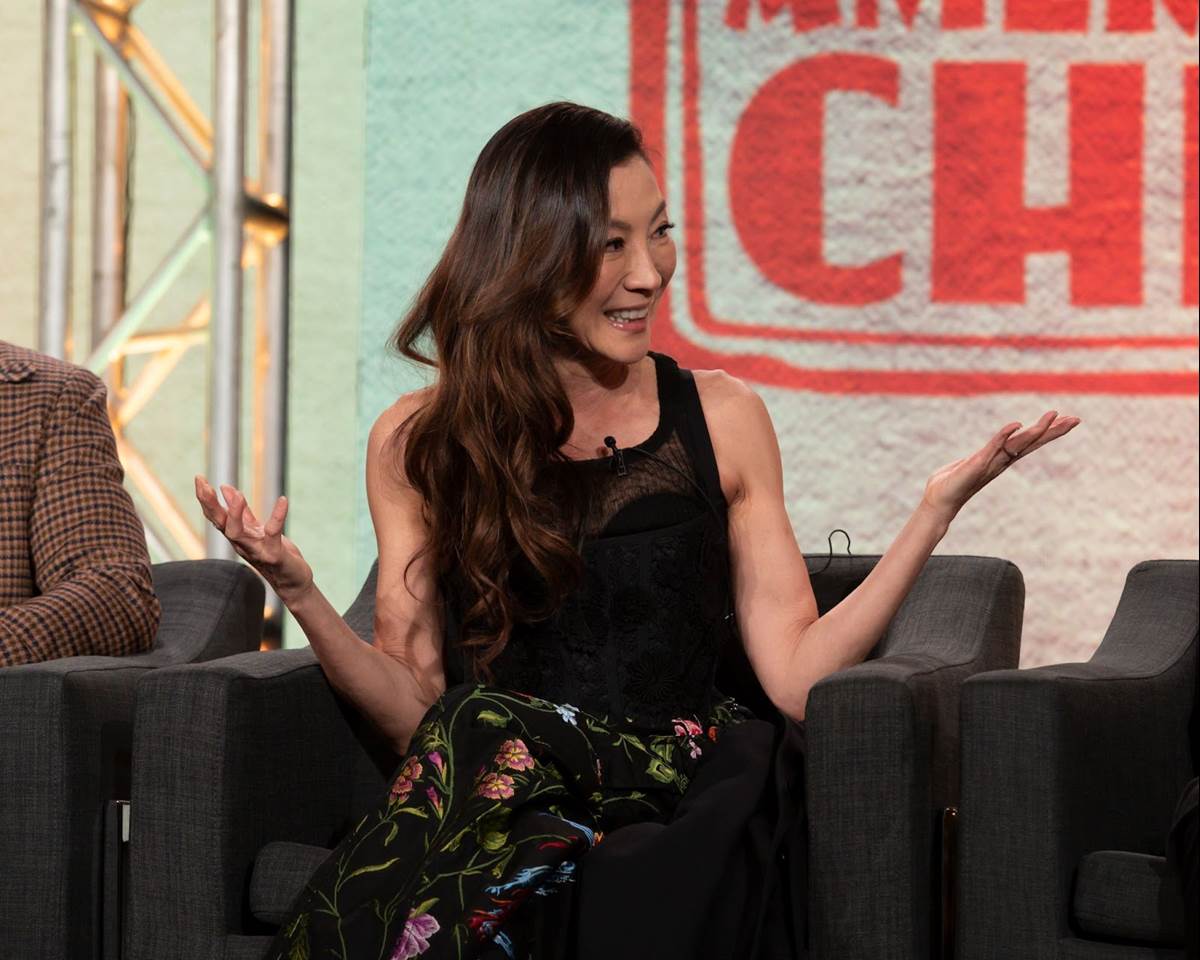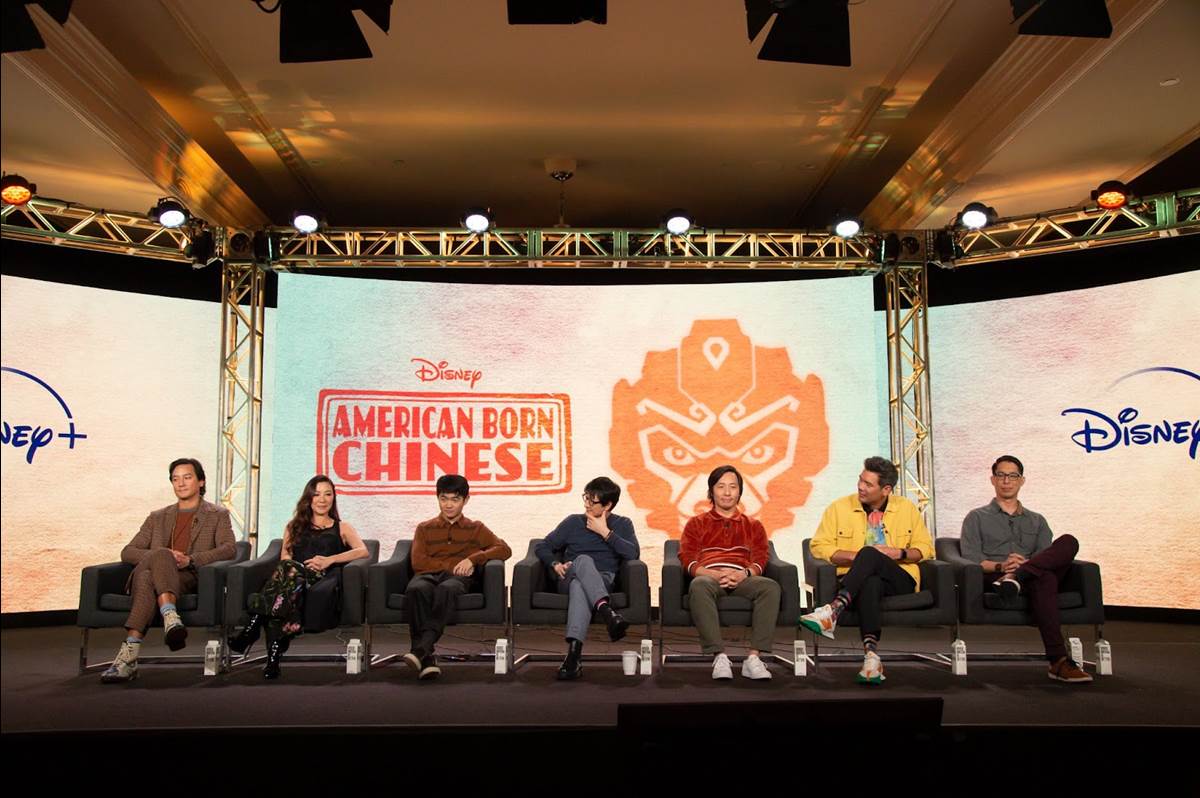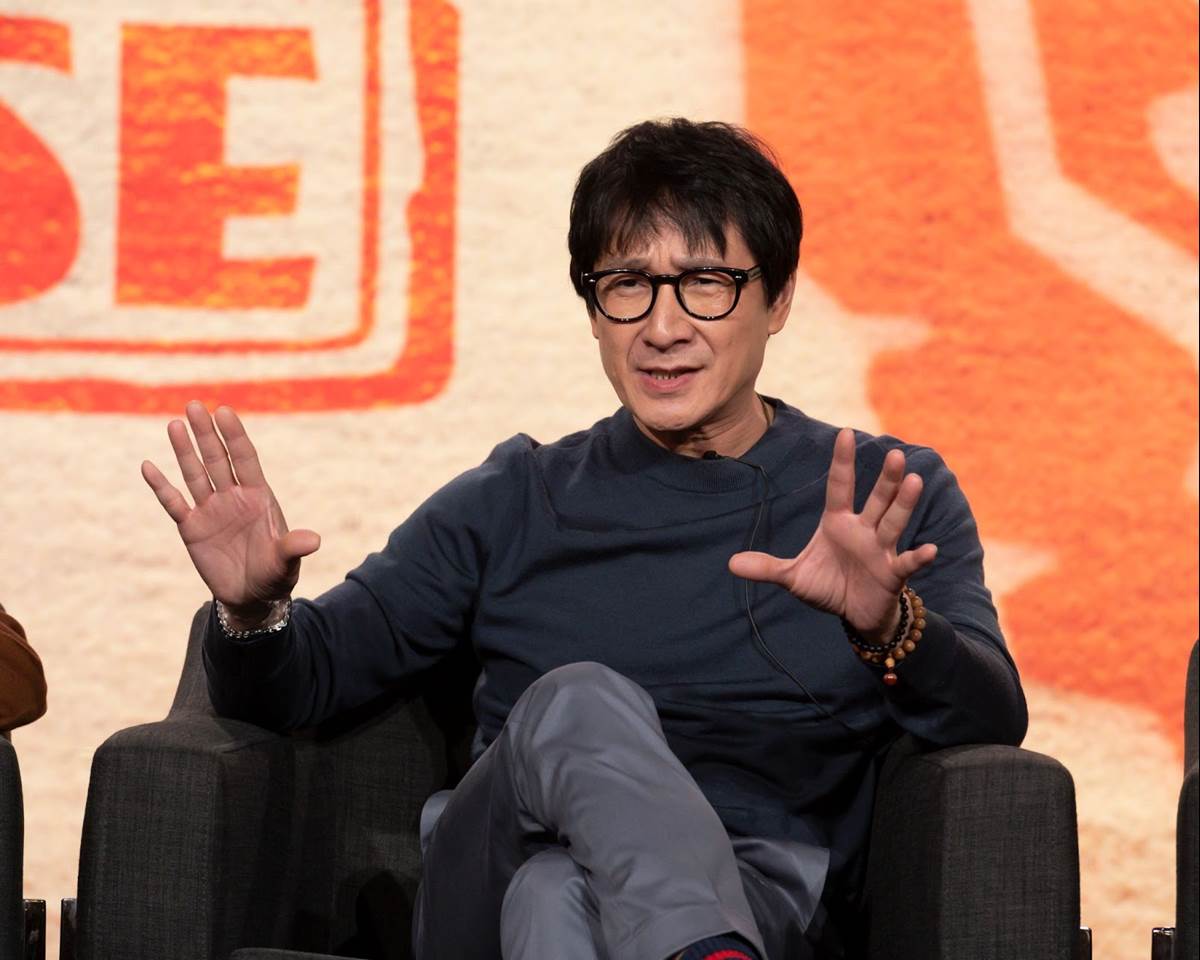“[Destin Daniel Cretton] sent me a text and said, ‘Come and play,’” Oscar-winner Michelle Yeoh said of reuniting with the Shang-Chi and the Legend of the Ten Rings director on the Disney+ original series American Born Chinese, streaming May 24th. During a TCA press conference in January, Michelle Yeoh was fresh off her Golden Globe win for Everything Everywhere All at Once. “Learning about what the story was about, it is very inspiring. And I think it was also the right time to be sharing more of our culture with the rest of our friends. And then getting an opportunity to work with Daniel [Wu], I mean, we go way back, but we've never worked together before.”
“She's always been an icon in Asia,” gushed Daniel Wu about his longtime friend and American Born Chinese co-star Michelle Yeoh, who has been a household name outside of the U.S. for years before Pretty Rich Asians catapulted her career. Michelle and Daniel both play legendary mythological characters in the series. “Everyone who is Asian knows the Monkey King,” he shared. “I've been asked to play it many times in Asia, but I turned it down because there were so many of the rehashings of the same story of Journey to the West. What I liked about American Born Chinese, it was flipping this story on its head, taking the essential elements out, but also creating a new Monkey King, because he's slightly older. In the Journey to the West story, it's about his arc of becoming from this rebellious character to finding enlightenment. It's a metaphor for how Buddhism affects people. This character, instead of 2,000 years old, he's 4,000 years old now. He's eaten a little bit of stuff. He's a dad now, and so he's dealing with all of these things. It was a nice twist on this iconic legendary character that everybody knew about, and that's what attracted me to do this version of the Monkey King.”
“In Chinese families, you have an altar, and you always have the Goddess of Mercy, because she's the Goddess of Compassion, and she didn't go back to the heavens, because she stayed to look after the people of the world,” Michelle Yeoh said of her character Guanyin. While she is a well-known deity in Asia, her depiction in American Born Chinese is much more contemporary, with an incognito Earth version of her character. “She was wearing, like, sweats and baseball cap and things like that. But we were always very respectful of the Goddess of Mercy, because, I mean, she's very, very iconic in our world. And we had to be careful of how we did that without taking too much liberty and sort of damaging her persona. But it was really fun. I think the challenge, of course, was we had fight sequences in there. And working together with our stunt coordinator, I was like, ‘She is the Goddess of Mercy. She doesn't hit people. She's not supposed to be throwing punches and kicking.’ So when I had that big fight with The Bull King, I mean, he was totally angry. He was coming at me. So we did it in such a way, it was always deflective. It was almost like a dance, which even infuriated him even more. So it was nice to see the contrast of all the different fight sequences.”
“I have Michelle Yeoh to thank for inspiring me to get back into acting,” revealed Oscar-winner Ke Hey Quan, who reunites with his Everything Everywhere All at Once costar in American Born Chinese. “When I started out as a kid, it was very difficult to be an Asian actor at that time. There was just not a lot of opportunities.” In the series, Ke plays a ‘90s sitcom character named Freddy Wong, who would’ve been offensive to Asian Americans then, but is even more so now. Freddy is somewhat of a mirror to the challenges Ke faced in his younger years in Hollywood, and it was a role he was initially reluctant to take. “I think the audience is going to have a range of emotions. Some are going to be very angry with it. Some are going to think it's funny. In fact, when I was on set playing this character, I went through that range of emotions. And it's okay because that is something for us to talk about today and to make progress, to be better. But it's a conversation that needs to be had. Of course, a lot has changed, but I want the audience to see it.”
“I get to walk down the road that all of you guys have paved,” Ben Wang said to his co-stars. Ben plays the main character in American Born Chinese, Jin Wang, whose world is upended when mythological Chinese characters collide with his world. Ben felt a deep connection to Jin when he first read the graphic novel, but stepping into the role revealed just how alike the two are. “I grew up in Minnesota in a small town, and so reading that comic, even though that was based on [Gene Luen Yang’s] experiences in the '90s, a lot of it rang true for me because the Midwest is about 20 years behind. But at its core, American Born Chinese is a story about an American adolescent experience. It's about the true adolescent experience of this one kid who happens to be Chinese and have that cultural background and have that be a thing that he has to deal with all the time that feels like something extra, right? You have to deal with all of the normal hormones of being a teenager, and on top of that, you have to deal with this clashing of cultures, of the culture of your family, and the things that you want to be as an American teen. And I think that is so brilliantly tied to the metaphor of the gods and the mythological characters flying in and drop-kicking him and his friends and stuff because, in a way, that's sort of like the ultimate metaphor of everything that you have to deal with.”
American Born Chinese is an adaptation of the award-winning graphic novel of the same name by Gene Luen Yang, who serves as an executive producer on the series. “[The graphic novel] came out in 2006, and to go from there to here is absolutely mind-blowing,” the author shared. “I actually did American Born Chinese as a Xeroxed comic. So I would finish a chapter, I'd take it to my local Kinko's, I would Xerox copies, I would staple it by hand, and I'd sell like 16 copies. It would be like 15 of my friends, and my mom would buy it. So to go from there to here is really crazy.” The graphic novel juxtaposes three storylines that intersect in the third act, which is one of the biggest ways the series departs from its source material. “The book really is one beginning, middle, and end that's broken up into three parts. But the television series has to have a beginning, middle, and end for every episode. So how do you do that? What we did was we took that idea of breaking the narrative into three parts. And what that was supposed to illustrate was this idea that being an Asian American is like being caught in between worlds. In the book, it's like being caught in between three different worlds. So even though the television series is structured differently, that idea is still at the very heart of it. And I hope that comes through to the viewer.”
“It's a seminal work of literature,” showrunner and executive producer Kelvin Yu explained about adapting the material. “They teach it in universities, they teach it in high schools, it's featured in libraries all across the nation. So, when it was brought to me, it's kind of like a no-brainer in terms of the opportunity. The question is: How do you do that? Because it's so structurally innovative and interesting, but how do you make that into a television series? The two main challenges were updating it to 2023 because it was written in 2005, but it takes place in the '90s. Then the second challenge really was Ke's character, which is an overtly intentionally racist depiction of an Asian man. So how do we put that on TV in a palatable way that's not just trying to start fires everywhere? So those were the two things.” Like most modern films and shows with cultural specificity, the creative team made sure that the dynamics seen on screen were also reflected in all aspects of production. “We made it a point to hire Chinese American or Asian American talent and creatives and designers, and everybody had a story to tell. Everybody had skin in the game. Everybody brought more than just work to the office, so to speak, every day. And it really felt like we were just cooking with gas at that point.”
“Audiences are getting smarter in how much they are watching, and part of that is that it doesn't feel like audiences want the generic version of culture, or a surface representation of a culture,” director and executive producer Destin Daniel Cretton said of the show’s decision not to explain aspects of Chinese American culture that audiences may be unfamiliar with. “Whether you know that culture or not, I feel like those specifics are really enticing and lovely and makes the show that you are watching feel more authentic and real, which was something that we were going for from the beginning. Whenever you start getting into explaining something for an audience that doesn't know it, it just doesn't feel right. It doesn't feel like it flows. And so we want to treat our audiences like they are smart, because, when we do our test screenings, we realize that they actually are. They don't want to be talked down to.”
“For the longest time, we haven’t seen a show like this,” concluded Ke Huy Quan. “I don't think there's ever been a show like American Born Chinese on television that is so well done. The story is amazing, and it features an entirely Asian cast. And that's why I'm so grateful to Disney, to Gene for his amazing novel, and then Kelvin knocked this right out of the park with everything that he's done and with Destin. I mean, he's one of the greatest directors.”
American Born Chinese is now streaming on Disney+.



